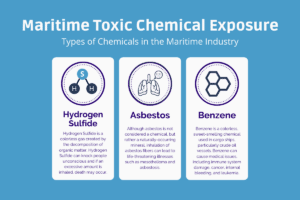Although getting burned by chemicals while at sea seems something that maritime workers need not worry about, the unfortunate fact is these types of accidents happen more often than most would think. In fact, burns and other wounds from toxic chemical exposure is common in the maritime industry, leading to severe injuries and even death. In addition to toxic chemical burns, seamen are also at risk of inhaling lethal fumes. While working aboard a vessel, workers by law must be given the right to work under safe conditions, including limiting exposure to chemicals. When seamen are not afforded this right, they have the option of pursuing legal charges against their employer for negligence under the Jones Act and general maritime law.
Types of Chemicals in the Maritime Industry
There are quite a few toxic chemicals in the maritime work that can lead to devastating results for those who come into contact with them. Some of the most common toxic chemicals include:

- Hydrogen Sulfide: Hydrogen Sulfide is a colorless gas created by the decomposition of organic matter. If fishing vessels are not properly ventilated, it can build up with no way to escape. Eventually, the gas becomes poisonous. Seamen in cramped, small, or enclosed space are at the highest risk of inhaling the toxic gas, although anyone at all who inhales it may be in danger. Hydrogen Sulfide can knock people unconscious and if an excessive amount is inhaled, death may occur.
- Asbestos: Although asbestos is not considered a chemical, but rather a naturally-occurring mineral, inhalation of asbestos fibers can lead to life-threatening illnesses such as mesothelioma and asbestosis. Many ships and equipment built prior to the 1980s were constructed with asbestos-containing products. A number of these ships and equipment are still in use in the maritime industry today.
- Benzene: Benzene is a colorless, sweet-smelling chemical used in cargo ships, particularly crude oil vessels. The seamen most affected by benzene are those who perform vessel maintenance and tank cleaning. Benzene can cause a host of medical issues, including immune system damage, cancer, internal bleeding, and leukemia.
How Maritime Workers Are Exposed to Toxic Chemicals
The most common way in which maritime workers are exposed to toxic chemicals while on the job is through inhalation. For example, since benzene tends to evaporate quickly, inhalation can happen without detection. Another common way maritime workers are exposed toxic chemicals is through the skin and eyes, particularly if the chemicals are liquid, gas, or solid. The least common way of chemical exposure is ingestion. However, when ingestion does occur, significant internal damage can occur, such as damage to the throat, mouth and stomach.
Employer Responsibilities
By federal and state laws, employers have the responsibility of providing safety training if their employees work around toxic chemicals. Safety training typically includes how to use protective equipment, how to use safety equipment, and what to do in the event of an emergency. Unfortunately, a myriad of seamen are not afforded proper safety training before working aboard a vessel with toxic chemicals. Furthermore, safety sheets must be provided at all times, which gives specific recommendations and instructions when working around toxic chemicals.
Employers also have the obligation to ensure seaman are working aboard a vessel that’s seaworthy. As mentioned earlier, hydrogen sulfide builds up and spreads throughout a vessels if it hasn’t been properly ventilated. A vessel without the proper ventilation is considered unseaworthy, which typically leaves the employer responsible for damages incurred.
Additional Resources
If you’ve been injured by toxic chemical exposure, keep in mind that general maritime laws as well as the Jones Act protects you in the event that injuries were a result of negligence from another party. You may be entitled to lost wages, pain, suffering, and more. For more information, refer to our articles Jones Act Lawyer and Maritime Rights and Compensation.